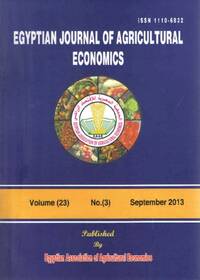Economic assessment of some technologies used in irrigated agriculture and their impacts on farmer’s livelihoods: Case of the Egyptian salt-affected soils farms

Authors:
Salinity is a continuous challenge in Egypt because of the dry climate, and more salt being carried by the Nile River 35 a result of pollution, water shortage, seawater intrusion and human practices. Accumulation of excessive salt in irrigated soils of Egypt negatively affects crops' yields, reduce the effectiveness of irrigation, deteriorate soil structure and affect other soil quality. This study was carried as part of the activities of the "Water and Livelihood Initiative (WLI)". In this study, we hypothesized that fanners in the Salt-affected soils of Egypt grow crops at all economically efficient scheme, they efficiently use irrigation water and they can cope with soil salinity through using sustainable water-saving technologies and land conservation practices. This study aims t<t measure economic efficiency and water use efficiency [or crops grown by the sample fanners, and identify sustainable water saving technologies and land conservation practices they use to combat inappropriate soil conditions and poor irrigation management in the salt-affected land. The study used data of survey conducted in South EI Husainia Plain (Egypt) in 2011nOl2 to calculate some economic indicators. Empirical findings showed that growing wheat, clover, cotton and maize is promising in the study area. Therefore. Farmers are encouraged to grow wheat and clover in winter whereas in summer, they are encouraged to grow cotton and maize since wheat and clover were the most economically efficient crops grown in winter whereas, cotton and maize gained the highest economic efficiency in the summer season. Clover and maize were the most profitable crops from water efficiency standpoints in winter and summer, respectively. Farmers in the study area use laser leveling, agricultural gypsum, sub-soiling, improved varieties and raised bed in their farms. Therefore, farmers are encouraged to adopt sustainable water-saving technologies and land conservation practices to overcome inappropriate soil conditions and irrigation management. Indeed, sufficient fanner's access to knowledge and improving communication channels between the fanner and the agricultural extension, and skilled extension personnel on management practices relevant to salt-affected areas are of high impedance to transfer such promising techniques to farmers in the study area.
